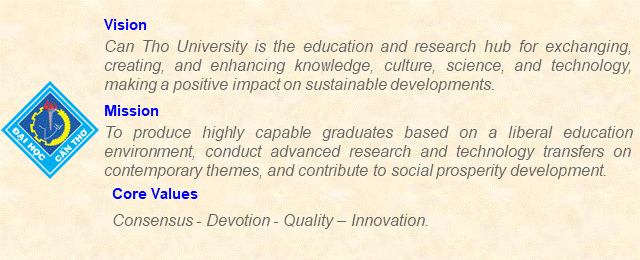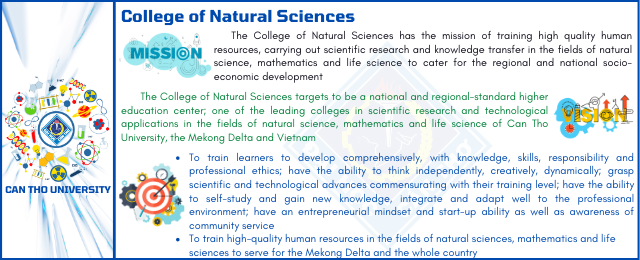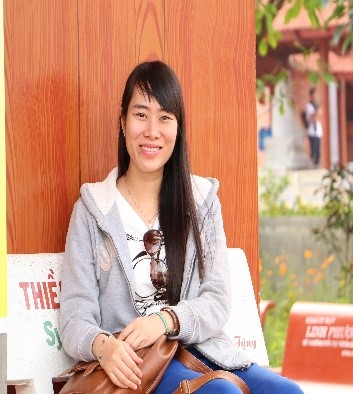Research Fields
The on-going research at the Biology department focuses on fundamental and applied biology to meet the demands for sustainable development of the Mekong delta of Vietnam. These studies have been well-supported and cooperated by local as well as international universities and research institutes.
* Biodiversity. Examination of the diversity of phytoplankton, higher plants, molluscs and arthropods in some regions of the Mekong delta of Vietnam. The biodiversity collections are used as illustrations for teaching and references for advanced research.
* Bioassay. Screening for biologically active compounds against diabetes, oxidants and pathogenic bacteria from local medicinal plants. Pandan (Pandanus amaryllifolius R.), guava (Psidium guajava L.), great morinda (Morinda citrifolia L.) and bitter melon (Momordica charantia L.) have been reported to reduce blood sugar level in diabetic mice. Medicinal plants such as great morinda, pandan and acanthus (Acanthus ilicifolius L.) also perform antioxidant activities. In addition, extracts of the medicinal herbs were examined for their activities against pathogenic bacteria in aquaculture. False daisy’s extract shows the activity to inhibit the growth of bacterial strains belonging to Enterobacter cloacae, Vibrio brasiliensis and Vibrio parahaemolyticusisolated from the intestine of the diseased giant tiger prawns (Penaeus monodon). These studies will be continued to clarify mode of action of the medicinal plants and to set up a plan for exploration and preservation of this resource.
* Nitrogen fixing, phosphate and potassium solubilizing bacteria. Isolation of rhizosphere bacteria capable of fixing nitrogen in rice fields of different ecological systems; bacteria able to solubilize phosphate and potassium in soils in the Mekong delta of Vietnam. Nitrogen fixing bacterial strains isolated belong to species Pseudomonas stutzeri and Burkholderia vietnamiensis while phosphate and potassium solubilizing bacteria are members of Agrobacterium tumefaciens, Rhizobium tropici and Azotobacter tropicalis. Research on nitrogen fixation as well as phosphate and potassium solubilization of those strains for rice and vegetable cultivation are being conducted in green house and in situ to select potential candidates for biofertilizer production.
* Biodegradation. Isolation of indigenous bacteria able to degrade intensively used pesticides and aromatic compounds in agricultural soils and in wastewater, respectively. Novosphingobium sp. KN65.2 performing carbofuran degradation activity was isolated and genes involved in carbofuran degradation pathway in strain KN65.2 were elucidated. Many bacterial strains belonging to genera Burkholderia, Cupriavidus and Ralstoniashowing herbicide 2,4-D degradation activity were also isolated from the rice fields and their genetics were fully characterized. With the availability of isolated strains and their genetic information, biodegradation of carbofuran, 2,4-D and structurally related pesticides recently used in rice cultivation areas in the Mekong delta of Vietnam will be further explored at molecular level. Additionally, biodegradation of aromatic compounds in wastewater has been studied. These research aim at setting up suitable bioremediation method to partially reduce the amount of xenobiotic compounds in soil and water.
* Application of microalgae. Microalgae have been globally attractive as a novel source of biomass that could complement the biomass supply for the production of food, feed, energy and chemicals. However, large-scale production of microalgae for biofuels is often hampered by contamination of cultures with grazers that feed on microalgae. Therefore, chemical method using natural chemicals extracted from marine microalgae, plant extracts and biological method have been studied to control grazers like ciliate, rotifer, etc. in the microalgal cultures. In addtion to controlling biological contaminants, microalgae have been studied for nutrients removal in wastewater treatment. Subsequently, microalgal biomass collected from wastewater treatment will be used as a bio-fertilizer for sustainable argiculture.
|
1 |
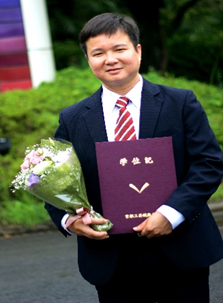 |
Dr. Tran Thanh Men - staff-code: 1974 Assoc. Prof. in Materials Science and Life Sciences Vice Dean of College of Natural Sciences Email: This email address is being protected from spambots. You need JavaScript enabled to view it. Link scholar: https://scholar.google.com/citations?user=K0xOwDkAAAAJ&hl=en |
|
2 |
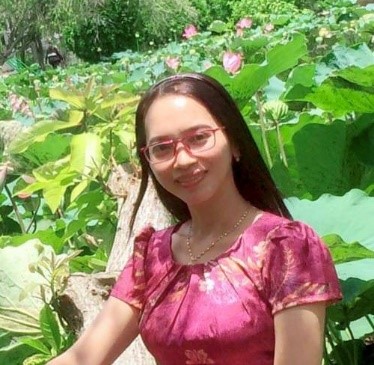 |
Dr. Nguyen Thi Kim Hue - staff-code: 1971 Doctor in Biology Deputy Head of Department Email: This email address is being protected from spambots. You need JavaScript enabled to view it. |
|
3 |
 |
Dr. Pham Khanh Nguyen Huan - staff-code: 2300 Docror in Materials Science and Life Sciences Head of Department Email: This email address is being protected from spambots. You need JavaScript enabled to view it. |
|
4 |
 |
Dr. Nguyen Thi Phi Oanh - staff-code: 0106 Doctor in Biotechnology Head of Cellular and Molecular Biology Laboratory Email: This email address is being protected from spambots. You need JavaScript enabled to view it. |
|
5 |
 |
Dr. Dai Thi Xuan Trang - staff-code: 1040 Assoc Prof. in Biochemistry Email: This email address is being protected from spambots. You need JavaScript enabled to view it. Homepage: DaiThiXuanTrang |
|
6 |
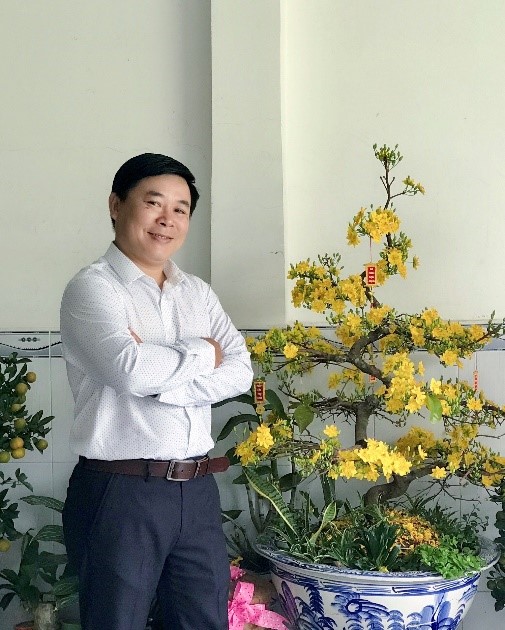 |
Dr. Ngo Thanh Phong - staff-code: 1100 Assoc Prof. in Microbiology Dean of College of Natural Sciences Email: This email address is being protected from spambots. You need JavaScript enabled to view it.
|
|
7 |
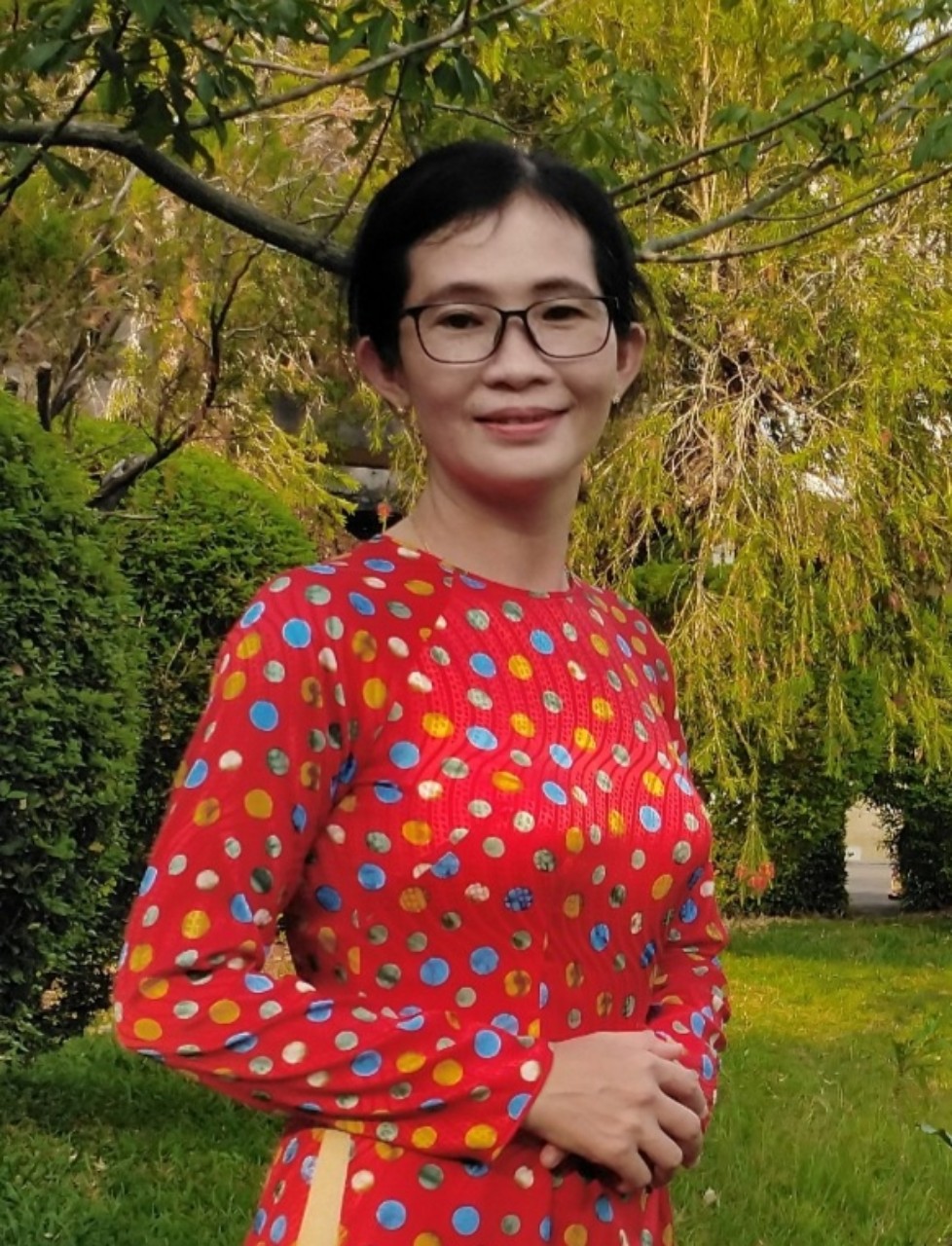 |
Dr. Phan Kim Đinh - staff-code: 0027 Doctor in Ecology Head of Animal and Plant Biology Lab Ph.D student, Biotechnology Email: This email address is being protected from spambots. You need JavaScript enabled to view it.
|
|
8 |
 |
Msc. Nguyen Thi Don - staff-code: 0028 Ecology Ph.D student, Microbiology Email: This email address is being protected from spambots. You need JavaScript enabled to view it.
|
|
9 |
|
Dr. Nguyen Nhu Phuong - staff-code: 2250 Doctor in Molecular Biology Email: This email address is being protected from spambots. You need JavaScript enabled to view it.
|
|
10 |
|
Dr. Vo Thi Tu Anh - staff-code: 2453 Doctor in Material Chemistry Email: This email address is being protected from spambots. You need JavaScript enabled to view it.
|
|
11 |
|
Dr. Phan Le Cong Huynh Bao Tran - staff-code: 2664 Doctor in Biology and Molecular Biology Ph.D student Email: This email address is being protected from spambots. You need JavaScript enabled to view it.
|
|
12 |
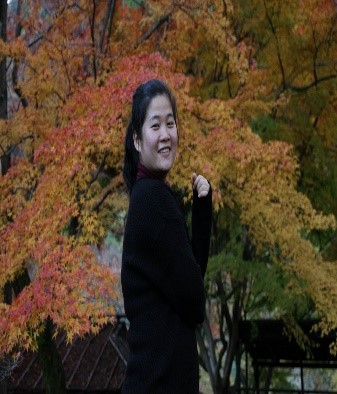 |
Dr. Nguyen Kim Dua - staff-code: 2608 Doctor in Biotechnology Email: This email address is being protected from spambots. You need JavaScript enabled to view it.
|
|
13 |
|
Dr. Truong Thi Phuong Thao - staff-code: 2609 Doctor in Biomedical Technology Deputy Head of Department Head of General Biology Lab Email: This email address is being protected from spambots. You need JavaScript enabled to view it.
|
|
14 |
 |
Võ Phát Tài – staff code: 010021 Researcher Email: This email address is being protected from spambots. You need JavaScript enabled to view it. |
|
15 |
 |
Huỳnh Hồng Phiến – staff code: 010069 Researcher
|
|
16 |
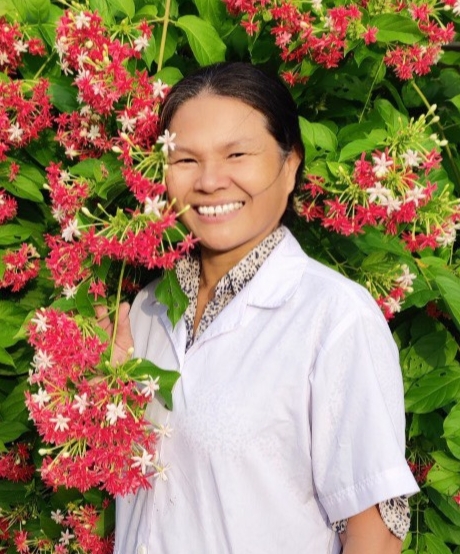 |
Huynh Thi Thanh Xuan - staff-code: 1177 Laboratory staff |
|
17 |
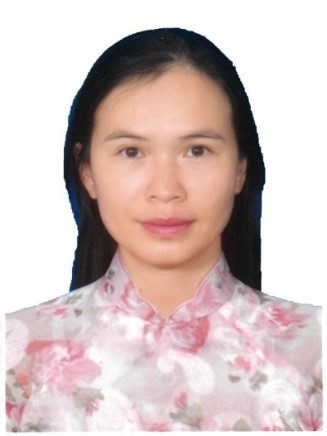 |
Tran Thi Trang Thanh - staff-code: 2930 Laboratory staff |
|
18 |
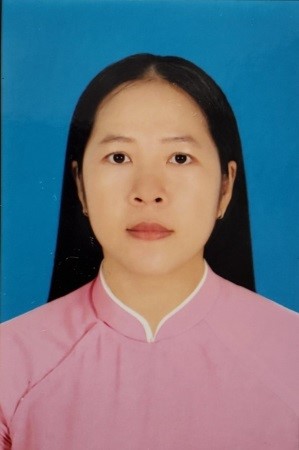 |
Nguyen Thi Y - staff-code: 3010 Laboratory staff |
- Training
The Department of Biology is responsible for training a master program in Ecology (since 1996), the bachelor programs in Biotechnology (2001-2005) and in Biology (since 2008). Staff members of the Department also guide several courses of General Biology, Biostatistics for students of other bachelor programs in other Colleges (Agriculture, Environment and Natural Resources, Biotechnology Research and Development, Aquaculture and Fisheries) of the Can Tho University.
- Scientific research
To meet the requirements for teaching activities of fundamental and applied Biology, the on-going research activities of the Department are focusing on 3 main topics:
- Biodiversity
- Microbiology: Nitrogen-fixing bacteria; phosphate and potassium-solubilizing bacteria; and polycyclic aromatic hydrocarbons (PAHs) degrading bacteria in soils and in waste water.
- Microorganisms metabolize nitrogen, phosphorus, potassium and decompose aromatic organic compounds in soil and wastewater.
- Bioassay: screening for plant compounds capable of diabetes regulation, anti-oxidation, gout treatment, and supporting the treatment of liver-related diseases using mice model.
- Study on the anti-oxidation, anti-aging, and anti-obesity of potential plant extracts using the Drosophila melanogaster as model.
- Research on biodegradation of pesticides and aromatic compounds stored in agricultural soil.
- Research on the biosynthesis of chitosan compounds and bioactive substances against pathogenic bacteria.
- Isolation and identification of bacteriophages to inhibit pathogenic bacteria to protect livestock, agricultural products and humans.
- Research on production of potential antibodies to treat anticancer disease on Nicotiana benthamiana
- Application of microalgae in the fields of environment and agriculture.
- Research on plant morphological diversity, plant anatomical structure and plant classification.
- International co-operation
The staff members of the Department have been joining in the research groups focusing on:
- Application of Drosophila model and Vietnam-originated natural substances for human disease study, Kyoto Institute of Technology, Japan.
- Genetic assessment of pesticide-degrading bacterial communities in the Mekong delta of Vietnam, KULeuven, Belgium.
- Staff organization
- Head of Department: Associate professor Tran Thanh Men
Responsibilities: managing general missions of Dept., postgraduate management, quality assurance for postgraduate education, and staff management)
- Deputy Head of Department: Dr. Pham Khanh Nguyen Huan
Responsibilities: university management, quality assurance for university education, and student affairs)
- Deputy Head of Department: Dr. Nguyen Thi Kim Hue
Responsibilities: facility management, scientific research, international co-operation
Page 2 of 2
-
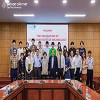 Welcome Professor Kaeko Kamei - Vice Director of Kyoto Institute of Technology (KIT)
From March 01st to March 05th, 2023, the College of Natural Sciences welcomed Professor Kaeko Kamei (Vice Director of Kyoto Institute of Technology (K...
Welcome Professor Kaeko Kamei - Vice Director of Kyoto Institute of Technology (KIT)
From March 01st to March 05th, 2023, the College of Natural Sciences welcomed Professor Kaeko Kamei (Vice Director of Kyoto Institute of Technology (K... -
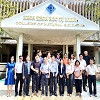 Meeting with the delegation of Faculty of Science, Khon Kaen University, Thailand
On February 15, 2023, College of Natural Sciences was honored to welcome the delegation of Faculty of Science, Khon Kaen University (https://www.sc.k...
Meeting with the delegation of Faculty of Science, Khon Kaen University, Thailand
On February 15, 2023, College of Natural Sciences was honored to welcome the delegation of Faculty of Science, Khon Kaen University (https://www.sc.k... -
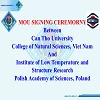 Meeting with Prof. Feng-Chuan Chuang and Prof. Pham Viet Phuong – National Sun Yat-Sen University
On February 13, 2023, College of Natural Sciences (CNS) was honored to welcome Prof. Feng-Chuan Chuang and Prof. Pham Viet Phuong, Department of Phys...
Meeting with Prof. Feng-Chuan Chuang and Prof. Pham Viet Phuong – National Sun Yat-Sen University
On February 13, 2023, College of Natural Sciences (CNS) was honored to welcome Prof. Feng-Chuan Chuang and Prof. Pham Viet Phuong, Department of Phys... -
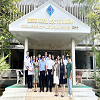 Meeting with Prof. Reza Ghiladi – North Carolina State University
On 11 January 2023, the college was honored to welcome Prof. Reza Ghiladi, Director of Graduate Programs, Department of Chemistry, North Carolina Sta...
Meeting with Prof. Reza Ghiladi – North Carolina State University
On 11 January 2023, the college was honored to welcome Prof. Reza Ghiladi, Director of Graduate Programs, Department of Chemistry, North Carolina Sta... -
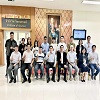 Information about the delegation in Thailand
From November 27, 2022 to December 1, 2022, the Delegation of College of Natural Sciences, including 05 lecturers and 06 students, visited and worked...
Information about the delegation in Thailand
From November 27, 2022 to December 1, 2022, the Delegation of College of Natural Sciences, including 05 lecturers and 06 students, visited and worked...
- Meeting with Prof. Alex Smirnov and Prof. Tatyana Smirnova – North Carolina State University
- The meeting with Delegates of National Central University
- Meeting with Dr. Kamolchanok Umnajkitikorn - Suranaree University of Technology, Nakhon Raschasima, Thailand
- Signing ceremony of the memorandum of understanding
- Field Trip for Biodiversity Subject


